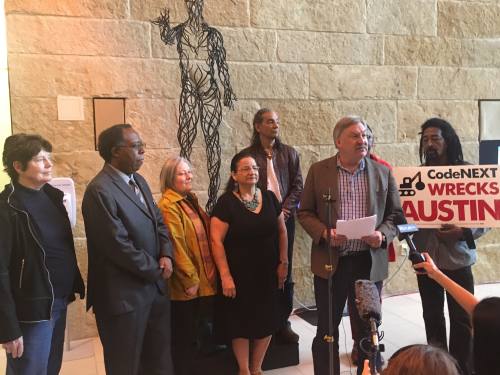A group of Austinites sued the City Council and city manager Friday for dismissing a valid petition and voting against putting a measure on the November ballot to question whether citizens should have voting power over a land development code rewrite.
Leading up to the May 24th vote, city leaders and other parties involved acknowledged that lawsuits were imminent. At the center is CodeNEXT, the city’s five-year, $8.5 million project to rewrite the land code that has drawn sharp political lines through Austin’s neighborhoods.
Local attorney Fred Lewis filed the suit on Friday. Lewis is a leader in the anti-CodeNEXT ensemble Community Not Commodity. The suit was filed on behalf of vocal CodeNEXT opponents such as Jeff Jack, president of the Austin Neighborhoods Council; Mary Ingle, the neighborhood group’s former president and Nelson Linder, president of the Austin chapter of the National Association for the Advancement of Colored People.
The suit asserts that Austin’s elected officials and City Manager Spencer Cronk failed in their governmental duties and interfered with the legislative power of the people.
“Texas courts generally do not allow city council to interfere in the initiative lawmaking process, which is the people’s exercise of direct democracy where their elected officials have failed to act,” the suit says.
Lewis said they are asking the court for an expedited hearing, as the goal remains to get this figured out in time to place it on November’s ballot.
District 7 Council Member Leslie Pool declined to comment, other council members and mayor Steve Adler did not immediately respond to Community Impact Newspaper's requests for a response.
Background
In March, the city received a petition with what would be 26,000 valid signatures from Austinites demanding the city pass an ordinance to give residents voting power on any comprehensive rewrite of the land development code—a citizen-initiated ordinance.
After hearing third-party legal advice that state statute says zoning laws are outside the scope of citizen-initiated ordinances and the city has no authority to act on the petition, City Council voted 6-4 in April against adopting the petitioned ordinance.
However, since there was a valid petition and city council did not adopt the requested ordinance, law then requires citizens to decide on the ordinance through a citywide referendum. In this case, it would basically be a referendum on whether to hold a referendum.
City Council voted on May 24 to keep it off the ballot on the advice of city and third-party legal advice. The issue will now be battled out in court.





